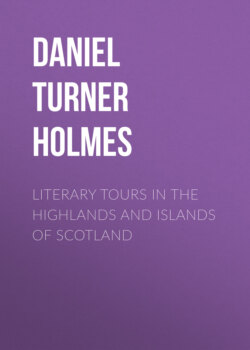Читать книгу Literary Tours in The Highlands and Islands of Scotland - Daniel Turner Holmes - Страница 25
На сайте Литреса книга снята с продажи.
NOTE ON INVERNESS SURNAMES, ETC.
ОглавлениеTable of Contents
Let me mention here a very useful and interesting piece of philology that was done by Dr. Macbain in 1895. That eminent scholar, working on the Inverness Directory, analysed the names occurring there, explained them on sound principles of etymology, and gave percentages of Celtic and Saxon surnames in the Highland capital.
Roughly speaking, the Directory of 1894–1895 had 5,000 single entries, and 750 distinct surnames. Of these surnames, only 110 are pure Gaelic. About 70 per cent. of the natives are, however, supposed to be of Highland descent.
Dr. Macbain points out that certain Highland clans have names that are not Celtic: Grant is from the French "grand"; Fraser from the French "fraise," a strawberry (the Frasers have a strawberry in their coat-of-arms); Chisholm is English and means "gravel-holm,"—the Anglo-Saxon ceosol (pebble) is preserved in Chesil Beach and Chiselhurst; MacLeod signifies "son of Ljot"; and ljotr is the Norse word for "ugly." Campbell is probably Norman-French, though Dr. Macbain suggests cam-beul, Gaelic for "crooked mouth." In olden times an external conqueror would sometimes subdue a district, and call the natives after his noble self.
The commonest names in the town are Fraser, Macdonald, Mackenzie, Macintosh, Ross, Cameron, and Munro. About 1,200 of the population have one or other of the first three names. The Frasers are an easy first, and form more than 9 per cent. of the population.
John, Alexander, and William, are the commonest Christian names in Inverness. "It is remarkable and indeed regrettable," says Dr. Macbain, "that the Gaelic Christian names (Donald, Duncan, Kenneth, Murdoch, and Angus), are not higher in the list."
The name of the first recorded inhabitant of Inverness (A.D. 1200) is Geoffrey Blount, a feudal warrior no doubt (French blond). In the thirteenth century we have the names Noreys, Grant, and Hay. In the fourteenth century the leading name is Pilch, derived from peluche, the French for "plush." In the fifteenth century, Reid, Vaus, and Cuthbert are prominent citizens. Vaus is said to mean "of the vales," i.e., de Vallibus; Reid is Scotch for "red"; and Cuthbert is pure Lowland. Evidently the leading men were aliens and interlopers.
